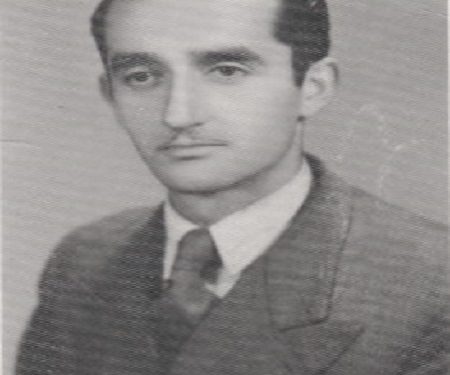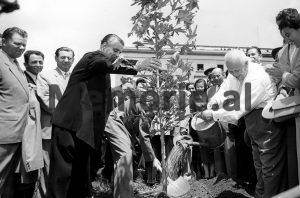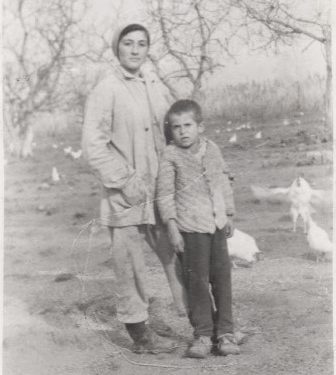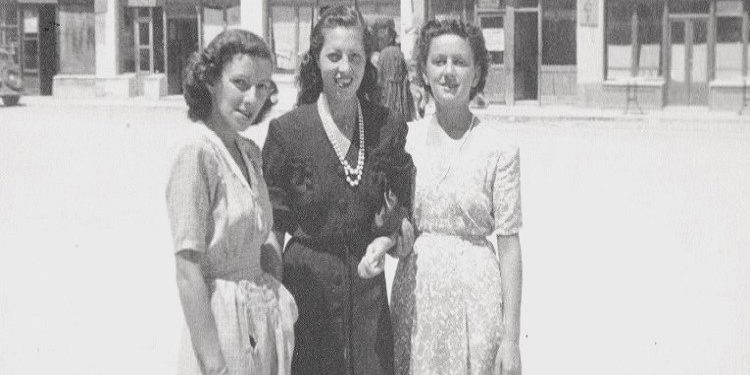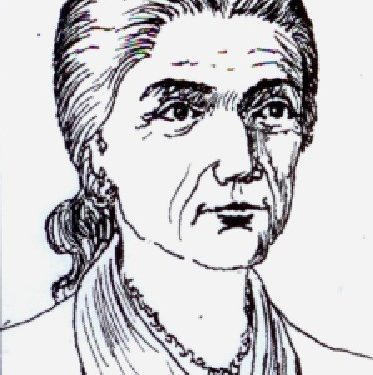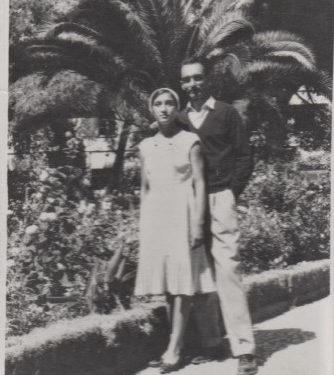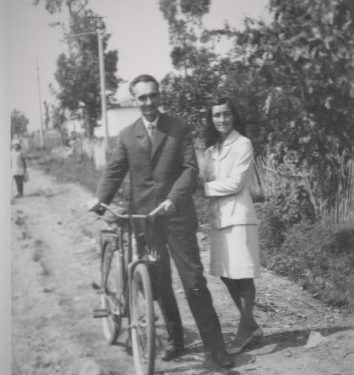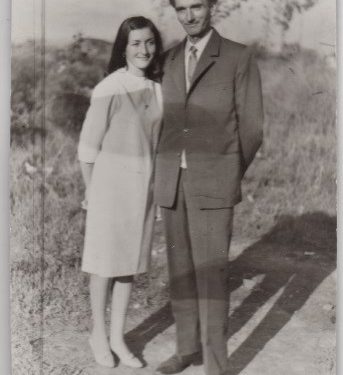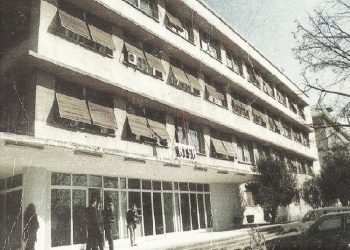By Lek Pervizi
Part sixteen
THE ODYSSEY OF INNOCENCE
To my brother Valentin, who endured?
47 straight years of the ideological storms of
communism, moreover, separated
from his wife, a true Odyssey
in the middle of the twentieth century.
Memorie.al / When you enter Skuraj and cross the Urdhaza stream, the mountain climb begins, on the hill called of the Lekbibajs. You pass in a row the three mills known as Gjin Pjetri’s, which rise one after the other. You also pass the two-story tower of Ndrec Pjetri, Gjin’s younger brother, and then you encounter a rocky ridge on which stands a complex of three stone buildings, the historic towers known as the towers of Gjin Pjetër Pervizi of Skuraj, the leader of the Kurbin uprising. These buildings dominate the entire valley, which is formed by the confluence of the Mat and Fan rivers (a tributary of the Mat), up to Milot. It is almost a fortress, which protects and defends the area from the expeditions of foreign invading armies that could penetrate through that gorge, until they met the wall of the Skuraj Mountains, where the towers we mentioned were erected.
Continued from the previous issue
These men were a veritable body of senior university professors and capable of running an academy. But the totalitarian communist state and its dictator Enver Hoxha were for the elimination of this layer of distinguished intellectuals. For us young people, this was a pleasant surprise, because even though in very bad circumstances, we were getting to know the elite of intellectuals, not only from Shkodra but also others, famous names, with whom my father had acquaintance and friendly relations.
Even in that circle of 100 people, Valentin’s story was viewed and judged as a special and unbelievable event for the circumstances that had been created. How was it possible that a man, who had spent all his youth there among the miracles of Italy, in the center of civilization, regardless of the war, would go to his end in the bolshevik hell, with his Italian wife, from which hell people sought to escape by risking their lives. This sparked a conversation about fate, concluding that it was precisely a mysterious force or power that influenced the determination of a person’s life, from which influence one could not escape.
The people had defined this problem very well: fate opened the door, either for good or for bad. They accepted that they too had entered the gears of a bad fate, but Valentin’s case was very special. It was understood that the person who had persuaded him and brought him to Albania, his school friend, Nuri Nuçi, had left for Italy, without a thorn in his foot with his wife, three months later.
This man must have been either a tool of fate or of some human force replacing fate, which was the State Security. So everyone lamented Valentin’s fate, while they themselves were victims of fate.
The Shtyllazi camp was transferred to Radostina, where the final work of that canal was continuing. One morning when the internees got up, what did they see? The prisoners had disappeared; they had been transferred during the night. Only the dividing fence and the guard post without a guard and the wire door were left open. We all gathered in the courtyard in front of the barracks.
No one dared to approach the door, much less go out of it. When a “Jeep” came, from which an officer got out, which the prisoners recognized: Security Colonel, Shpend Dega, from Tropoja, an ignorant with calluses, but also with shoulder pads. He was accompanied by two police captains, surprisingly unarmed. He took a place in front of the group of convicts:
-“Listen, the party and the government have decided to release you from the wired camp, because it has been ascertained that you have changed your heads and have improved. You must understand that we work for the good of the country and its citizens. Therefore, from today, you are free to circulate within the Fier area, on the condition of a mandatory roll call, two or three times a day, which will be done by a captain, who will be specifically assigned to you.
You can find a job, but always with the knowledge of this captain. You are provided with bread and a can of meat preserves, per week. Did we understand”?! He came and went with that arrogant behavior. As soon as the officer left, the people from Shkodra started making fun of each other, how was it that we had changed our heads, without knowing it?! “Why, do we have other heads now?! The party knows”!
The purpose must have been different. While they were waiting for another decision to come, to be released completely and return to their homes, all of a sudden one morning when the roll call was to be made, a truck arrived, and an officer who got off with a letter in his hand, said: “Those who will hear the names, take their belongings and get on the truck”.
They were the names of twenty people, who were considered fit for work. Among them Valentin, along with Guljelm Deda, Isa Kokalari, Nikoll Paluca, Pjetër Bardheci, Mit’hat Araniti, Ibrahim Sokoli, Estref Frashëri, some people from Korça and others, exactly 20 people.
Where were they taking them?! All of a sudden a letter comes from Kuçi of Kurvelesh, from Valentin. It was written that they were in Kuçi, repairing two houses, where you will all be brought as well. So the purpose of the Shtyllazi camp had its end in our isolation, in the deep area of the Kurvelesh gorge, about a 6-hour bad road from Vlora. «But why did that gentleman tell us that you have changed your heads?! We still have the same heads, we couldn’t have changed them”! The old men from Shkodra continued to joke.
A month didn’t pass and precisely on the 28th of November, they put the rest of us on two uncovered trucks, and in the rain, which they had thrown a large tarpaulin over. They started us towards Kuçi, where we arrived at night. Thus was founded the isolation camp of Kuçi of Vlora, or Kurvelesh, on November 28, 1955. In two houses of the Gjolekaj family, repaired by the internees. The village of Kuçi was known as a communist village, with 400 houses and 400 officers (all from Security).
On this occasion, Valentin had the opportunity to write a postcard to Gori from the Kuçi post office and received a reply with a postcard. Gori wrote that she had found out where he was. In a beautiful and climatic place. She went to the officers’ house, where on a military map, she had found the mountain Kuçi where her “Ulysses” was “having fun”. Valentin had replied to her that it would be good for her to come and “enjoy” the beauty of that place together with him.
Of course, Gori had understood where he was and why they had taken him there. We were not forced to work and they gave us the bread ration for a week, which came from Vlora and nothing else. We could roam through Kuçi, to the only club and a couple of shops. Since they only gave us bread, to buy some food item, the command allowed us to extract gorse root, which the collection center bought for a fee. But we had to respect the roll call, three times a day, and not leave beyond some certain limits.
The Kuçi camp was turned into a real Academy, where out of 100 people, 60 were graduates of the best European Universities and with titles, Prof. Dr. and high state, cultural, economic, military functions, etc. A significant curiosity. Kuçi had no electric lights. The engineer Estref Frashëri, proposes to the Kuçi Council through the command, that they were able to supply the village with electricity if they wanted to.
The proposal was accepted and these “enemies of the people” built a kind of hydroelectric power plant in the Buronja stream, building a tunnel for the water to gush with force, where a powerful electric motor was placed (according to the request of the engineer Frashëri), which they had brought from Vlora.
They arranged the wooden blades and made the appropriate connections and snap in every house of Kuçi, the lamps were lit, because the Council had completed the distribution of the line. This work changed the minds of the Kuçiots, where the Security and the party had spread the deception that in the Kuçi camp, the party and the government had brought dangerous people, enemies of the people, and criminals, knowing that the Kuçiots were loyal people of the party and the government, determined and vigilant, who hated these enemies and would show them their fist and their place, when the job called for it. The opposite happened. The Kuçiots realized that they were dealing with the cream of Albanian society. Peaceful, knowledgeable, and wise people.
The day came when after three years, in 1958, the camp was closed as a result of the rapprochement of Khrushchev with Eisenhower and the visit he made to America. They gathered us all in the Gradishta camp, amidst the swamps of Lushnja, where they initially assigned us to agricultural work. But why?! It was nice to see professors hoeing corn, cotton, and digging drainage lines and canals. A great shame that could not be conceived by a sane mind, but realized by some diabolical minds, who hated the high virtues of European civilization, which had enlightened the entire world.
To have studied in European countries constituted a serious act of accusation, where the pretext was found to shoot you and sentence you to prisons and internment camps. To be treated as a slave-peasant, slave, and working animal! How could poor Gori, this “Penelope” of the 20th century, imagine that her husband, an academic officer with an excellent perspective, would stay all day hunched over a shovel, pickaxe, and hoe, for a piece of bread?! Even when later these works were shown and explained to her, she could not believe them, so absurd did they seem to her. Not only to her, but to anyone with a normal mind in the society of civilized Western countries.
Would the adventures of our “Ulysses” have ended? Returning to the conditions of a more free internment, without a barbed wire fence, the internees could not get rid of the roll call, two or three times a day, according to the mood and whims of the captains. In Gradishta, we were reunited as a family, even with Genci, who was released after 10 years in prison, in 1957. He was engaged to the daughter of Llesh Marashi, Albina, whom he married in 1958, in Gradishta. These new conditions gave Valentin the opportunity to write to his “Penelope,” who was calmed and rejoiced for the “Ulysses” who had passed through less stormy seas.
Again, hopes for an improvement in the situation began to revive. A certain softening, between the Americans and the Soviets, had lowered the tension of the terror. Which now also included the ranks of the communists, ever since the Tirana Conference, in 1956, where some of them paid with their lives and others ended up in prisons and internment camps? It happened that Khrushchev came in 1960 to visit Albania. A great mobilization, for his triumphant reception. This mobilization also included us internees.
All of us men were removed from work and the sectors near the city of Lushnja, and were locked up for two weeks in the cotton and corn cribs of the distant sectors, among them Gradishti, where we were only given the bread ration. We were guarded by armed police and had no right to circulate outside the area of the cribs.
It was summer and they had put us in there, without a mattress or cover, only with the clothes on our bodies. These were supposedly Security measures against us, as “sworn enemies of the people and the party, lest we do something bad”. This was during the entire time of Khrushchev’s visit.
Regardless, the situation had been softened by the rapprochement of the Russians with the Americans, which had culminated in the embrace of Khrushchev with President Eisenhower and Khrushchev’s visit to the corn fields in Dallas. After two weeks, they returned us to our previous state and to the jobs they had assigned us. Valentin and I, with some others, were assigned to the construction sector of the farm.
The farm attracted me to the Pluk sector, as a painter and as a good professional (this is what my reputation was) in construction, mechanical, and other works. Valentin worked in a construction brigade in Çermë, where they would take him by car and return him to Gradishta on Sundays, accompanied by policemen.
We, some internees who had been assigned to Pluk, about 10 people, slept in a barracks with reeds, plastered from the inside. Petrit Merlika and I were assigned near the workshop and the carpentry. Petriti, an engineer, released after 10 years in prison, performed mechanical work. He also had an Italian wife, and fate had caught her, so that she had not left for Italy. So poor Elena, a literature professor, had passed through Tepelena, carrying wood like an animal. A fate that would have caught Valentin’s wife as well.
Meanwhile, I was listed near the carpentry but also performed the work of a painter for socialist emulation (as it was called) and other activities of the type) such as agricultural exhibitions, museums, agrotechnical cabinets, etc.
In these conditions, I also got married, and we were given a room as a dwelling. Thus Valentin stayed with us throughout the work week and went to Gradishta on Sundays. This gave him the opportunity to also go to the city, where he would post some letter or postcard.
It was as if certain, more regular correspondence were established with Gori. From this kind of freedom, in the letters of Valentin and Gori, their inexhaustible love and the hope of a close reunion were expressed. With the breakdown of relations with the Soviet Union, the situation seemed to worsen again, and the connection with China made it even worse. The correspondence with Gori was blocked. A very long time of silence passed. The letters and postcards neither went nor came. Why?!
Valentin (and the rest of us) were worried about this matter and the separation that was lasting, without seeing an end to it. Of course, even more so his wife in Bologna. She, worried, again addresses the Ministry of Foreign Affairs. A telegram comes from the Embassy in Tirana, which read:
“As long as the current regime in Albania continues, it is considered that it will be very difficult for Pervizi, who is considered an “enemy of the people,” to be able to gain freedom.” Memorie.al
Italian Embassy
September 29, 1967.




